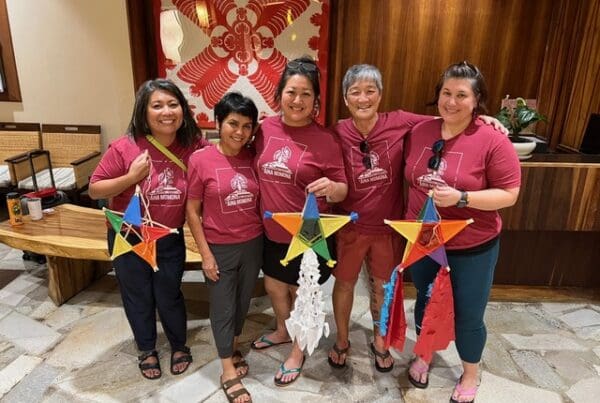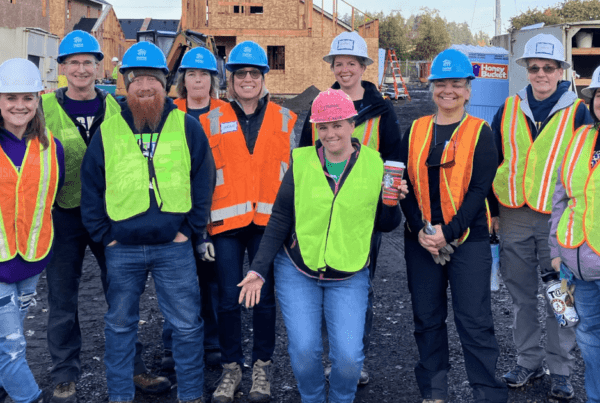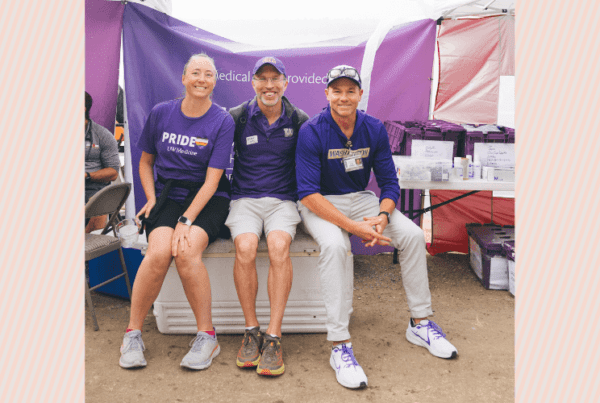Shortly after Hurricane Harvey made landfall on the Texas Gulf Coast, seven members of a Disaster Medical Assistance Team from UW Medicine arrived on the scene. They were joined by other volunteers from Oregon, California and Georgia. As part of the National Disaster Medical System, the team set up a portable field hospital outside of Houston and began seeing patients from a nearby shelter and the adjacent community.
For a glimpse into their deployment, I spoke with Dr. Stephen Morris, who practices emergency medicine across the UW Medicine system, and Mary Jo Kelly, who has been with UW Medicine for 24 years as a clinical care nurse specialist, now at Northwest Hospital and previously at both Harborview and UWMC.
What is a Disaster Medical Assistance Team?
Stephen Morris: The team is staffed by medical professionals and para-professionals who support local health systems in providing expert patient care. It is organized by the U.S. Department of Health and Human Services. We are federal employees during a deployment. We also are very restricted in our movements, and our base is provided with military security.
Mary Jo Kelly: We are on call four times a year for two-week deployments. Since we work with other healthcare professionals from across the country, team building is part of our experience. I find that we always mesh very well because we have a common purpose and choose to be away from home to help others.
How would you describe your working and living conditions?
Stephen Morris: We arrive with all the medicines and supplies needed to set up a field hospital (think of the TV series M*A*S*H). Living conditions are usually austere, but in Houston were quite comfortable. Even though we ate MREs (Meals Ready to Eat) 70 percent of the time, we had air conditioning in the large tents that served as hospital, dining room and sleeping quarters.

What were the major healthcare needs after the hurricane and flooding?
Stephen Morris: Many of our patients had wounds that became infected from walking in water. We also saw cases of diarrhea and upper respiratory illnesses, which are to be expected under these conditions. For people with chronic conditions, running out of their medications was a problem. Fortunately, local area hospitals resumed operations fairly quickly, and we were able to close the field hospital at the end of our deployment.
Mary Jo Kelly: We were located in the parking lot of a middle school hosting a shelter and provided medical care to more than 500 patients from infant to senior. On a single day, we administered 100 tetanus/diphtheria injections.
What is your motivation for participating in disaster relief?
Stephen Morris: My first jobs were as a lifeguard and firefighter, so I have always been drawn to helping people in need. In emergency medicine, I deal daily with patients who are vulnerable, and this is also a focus of my academic research. I have previously served with relief teams in conflict zones in sub-Saharan Africa, and I ran a 1,200-bed hospital in Haiti after the 2010 earthquake.
Mary Jo Kelly: It’s very rewarding and eye opening. I am grateful to be able to use my nursing skills and knowledge to help people in distress, and they in turn are so appreciative. We also see the best in people. In Houston, for instance, the owner of a small pharmacy helped fill medications at our shelter. He wrote off all the costs to support his neighbors.
Are there lessons for us in Seattle?
Mary Jo Kelly: As healthcare workers, we need to make sure that we have plans in place to care for our homes, families and pets so that we can do our jobs. For me, this means making sure that my dogs are taken care of before I go on a deployment. While we used to say that people should have three days of emergency supplies on hand, the best advice now is two weeks. In Houston, I realized that dehydrated hiking food may not help in a disaster that impacts access to drinkable water. Everyone should have a good supply of water and non-perishable food.
Stephen Morris: Natural disasters are a wake-up call that we need to do a better job of preparing for extreme times. We should also anticipate the medical needs of various groups, such as the elderly and handicapped, during a disaster. In our personal preparations, we need to figure out a way to have access to medications even when we are away from our homes.
Final words?
Stephen Morris: I am thankful to all of the people who make it possible for me to participate in disaster relief, including my colleagues who take my scheduled shifts in the hospitals and my wife who takes care of our children and keeps the home front running smoothly.
Mary Jo Kelly: The entire team appreciates the support of our colleagues and UW Medicine to give us the flexibility to serve the nation.
* Pictured in photo (l. to r.):
- Ashley Rosenquist, Pharmacist, Harborview
- Mary Jo Kelly, A.R.N.P, Critical Care Clinical Nurse Specialist, Northwest Hospital
- Kris Benvenuto, R.N., Clinical Informatics Educator, UW Medicine
- Cheryl Stromberg, R.N., Emergency Room, Harborview
- Karen Alderman, R.N., Pediatric Critical Care, Airlift Northwest
- Martina (Marty) Hoyt, Respiratory Care Practitioner, Harborview
- Dr. Stephen Morris, Emergency Medicine, UW Medicine
Editor’s note: After a short time back in Seattle, the DMAT team was deployed in Puerto Rico to help with the recovery from Hurricane Maria.


